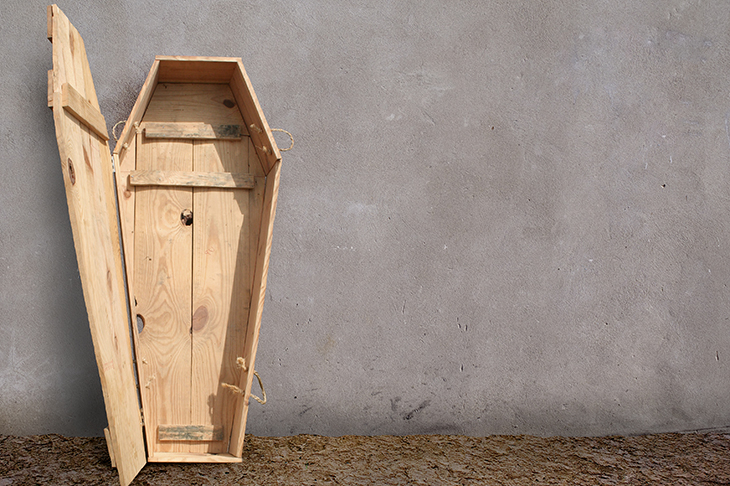H.G. Wells got it right in his comic novel The History of Mr Polly, where the wake is so much more fun than the wedding breakfast. How often have you come home from a wedding feeling slightly nauseous from an overdose of cheap champagne and fake bonhomie? Yet a funeral can be heartwarming and inspiring; a celebration, a gathering, without the flimflam and interminable jollity.
But how many of us will make plans for that final reckoning? How many will decide on the venue, the music, the food and flowers? Most likely it will be your relatives who will choose the coffin in the funeral director’s brochure (£265 for cardboard, rising to £1,990 if you want one in oak with the Head of Christ carved on the side).
My cousin designed her own bier, upon which on a windy day last autumn she was carefully lowered into her grave at a woodland burial site in the Yorkshire Dales. She was wrapped in a cream linen shroud decorated with dark-green ivy leaves and small star-like flowers mostly stitched by her (she was not given enough time to finish it). Every-thing about her burial was determined by her, thought about for months, if not years.
She had been brought close to mortality when she was a teenager, suffering from cancer, and her approach to death was unusually frank, embracing what for others is something so terrifying it is usually ignored. She wanted to organise her own ending, at least as far as she could, and in this she succeeded brilliantly — even if in the end death came upon her in her fifties, without warning.
Recently I was reminded of our conversations about that bier — its wood, its Viking prow in tribute to her father’s origins in the far north of Scotland — by Cathy Fitz-Gerald’s latest documentary for the BBC World Service, Coffin Club (still available on BBC Sounds). FitzGerald introduces us to the wonderfully cheerful and energetic Katie Williams, who ten years ago set up the Coffin Club of Rotorua in New Zealand to make her own coffin and to gather a group of like-minded others to do the same.
At first she thought her idea would be met by ‘dead silence’, she tells FitzGerald, the pun fully intended. But before long every room in her house was full of carpentry benches and people wielding hammers.
‘I’ve often thought it’s a shame that death can’t be celebrated as brilliantly and perfectly as new life,’ says Williams, now 80, who has worked as a midwife and a palliative–care nurse. Her friend Joyce’s coffin is apple-green in colour and decorated along the side with shamrocks and leprechauns to remind her of her late husband, who was Irish. Another member of the club confesses she’s an ‘Elvis nut’ and has smothered her coffin with pictures of her hero. There’s a full-length picture of him in his prime under the lid, she tells FitzGerald, laughing, ‘so he’ll be lying on top of me… for eternity’.
The coffins are painted every colour of the rainbow, lined with luxurious silk, and covered with pictures, letters, personal mementoes of a life. But where do you store a coffin until it’s needed? In Rotorua you come across them as a window seat in the living room, covered with cushions, ‘perfect for napping’, or as a chest in which to keep a collection of kites. My cousin kept her bier in the hall propped up against the wall.
Williams and her coffin club are part of a bigger movement of people wanting to take back control of death, to weaken the grip of the funeral industry and the medical profession. A century ago, people grew up with death — family members died at home and were kept there until the burial, the coffin lid left off until the body was lowered into the ground. Most people by adulthood would have seen a dead body. Now many people do not encounter death in the flesh until much later, and then often at one remove, the body whisked off to the mortuary straight from the hospital ward; the coffin only seen by close members of the family at the crematorium, the funeral taking place without it.
Nine years ago Jon Underwood, inspired by Swiss sociologist Bernard Crettaz, set up the first death café in the UK, to liberate death from what he called ‘tyrannical secrecy’. The cafés are not about bereavement counselling, says Dr Sharon Young of Death Café Kingston. For her, the afternoon meetings of cake and conversation allow people to talk about death — their own and that of those close to them. ‘Saying the words death and dying doesn’t make it any more likely to happen,’ says Young, whose impetus for setting up the café came from her academic research into end-of-life rights, or rather the right to die as we would like.
‘I might as well go out in a box I like,’ says Katie Williams, which sounds like sage advice to me.
Got something to add? Join the discussion and comment below.
Get 10 issues for just $10
Subscribe to The Spectator Australia today for the next 10 magazine issues, plus full online access, for just $10.
You might disagree with half of it, but you’ll enjoy reading all of it. Try your first month for free, then just $2 a week for the remainder of your first year.














Comments
Don't miss out
Join the conversation with other Spectator Australia readers. Subscribe to leave a comment.
SUBSCRIBEAlready a subscriber? Log in